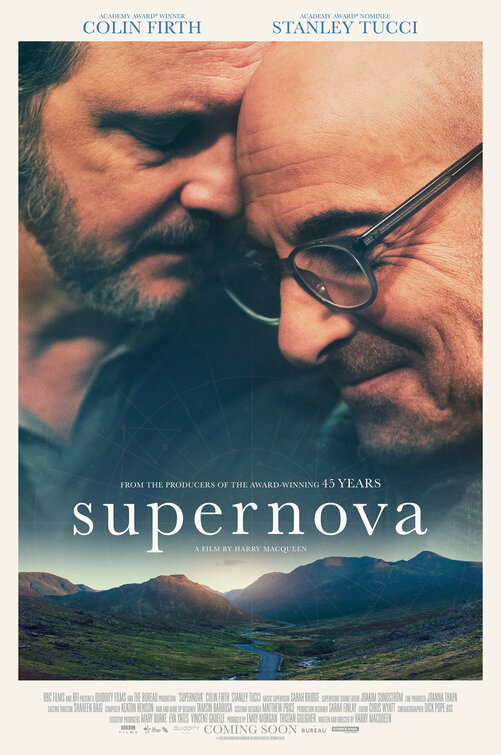Burn Bright
Director
Harry Macqueen
Starring
Colin Firth
Stanley Tucci
Couple, Sam [Firth] and Tusker [Tucci], travel north to reunite with friends and relatives before Sam, a concert pianist, is due to give a comeback performance. Early on, we learn that Tusker has been diagnosed with early on-set dementia and his wanting to deal with it alone, without causing significant harm to Sam, is putting a clear strain on both men and the relationship.
From the very outset, it’s clear that this story will be a painfully human, tender and most importantly sincere experience. With its calm slow pacing, the entire first half an hour sails by as we get to know the couple and explore the reality of what they’re facing. And with so little visually happening, this is primarily down to the delightful chemistry between Firth and Tucci. Tusker is a monstrous tease, Sam is slightly cantankerous and they are both gut-punchingly charming – brought effortlessly to life by two incredibly confident and capable actors.
Without sounding too obvious or redundant, anyone who enters into the contract of a long-term relationship inevitably confronts the fact that life is finite, that your time together is limited and you will die. Yet despite this fundamental part of love and life, hitting that reality is always a shock and watching these two individuals approaching the inevitable together has an empathetically tragic familiarity. Firth observing Tucci struggling to get dressed or perform other simple tasks never gets any less heart wrenching to voyueristically watch as an audience. And as much as the performances sell this to us, it’s ultimately the script that bluntly cuts through: “You know what the hard part is? You’re not supposed to mourn someone while they’re still alive.”
On a technical level, Supernova is exceptionally well made. The score is light and unobtrusive, to the degree that you don’t realise it’s all that’s present until you’re a few minutes into Sam and Tusker silently driving through the winding roads flanked by towering hills. Speaking of which, Dick Pope’s cinematography work is striking, with wonderfully framed shots. Being from Britain, I naturally fall into stages of under-appreciation but the landscape can be truly stunning and Pope captures the haunting beauty fantastically.
**spoilers throughout the next two paragraphs**
While this is an extremely well-acted, constructed and devised chamber piece, there was one major element that brought it all crashing down for me. That isn’t to say I’m about to rip this movie apart, simply illustrate a single decision in the writing process which sullied the film for me: I’m not entirely sure I was happy that the film became a suicide story. Of course a conversation about dementia will likely lead to a conversation about death but, as much as it pains me to say it, this conclusion felt a little lazy. With something like Million Dollar Baby, the film catches you off guard and evolves in the most painful way. Even something fairly trite like My Life tries to cover how a man with a form of degenerative cancer and his wife deal with the diagnosis and the impact it will have on their yet unborn child who will grow up without his father. I didn’t get that with this film.
Disappointingly, it felt that the narrative didn’t know where it wanted to go and ended up at a fairly safe conclusion. Suddenly a lot of what I liked about the film (take my highlighted scenes below for example) felt similarly overt. In that way, like an old familiar play, Supernova failing to traverse any new territory was ultimately discouraging. The saving grace, for me, is the fact much of this feeling is allayed with the ambiguity of the shared look between Sam and Tusker at the end of the movie, with Sam saying, “Let me be with you.” Is he making another plea to stay by his side as dementia takes hold or is he saying he accepts Tusker’s wishes and wants to be with him at the end? The only thing the audience is offered is Sam’s concert performance. Which is a fine ending to this tale.
In conclusion, Supernova is a satisfyingly constructed story with a few predictable exchanges but this doesn’t detract from the fact that they are delivered with such passion that one is able to completely overlook any reservations.
Release Date:
27 November 2020
The Scene To Look Out For:
To address what I stated earlier about simple but solid metaphors, I have highlighted two moments in particular. The very opening shots depict a bright star in central focus as a galaxy of pin-prick lights form around it. As the music begins to swell, the star burns brightly before disappearing. The second is Sam quietly turning the pages of Tusker’s notebook – which should house his new novel – to see the first few pages filled with notes and prose, only to degenerate into faint scribblings and torn-out pages before revealing the blank void of the remainder of the notebook. Both are admittedly serviceable and cutting but they’re also undeniably on the nose.
Notable Characters:
The supports are used sparingly but choosing between Tucci and Firth is frankly impossible. Both exude such presence and deeply viced emotional turmoil and rather than a battle between the two, there’s a distinct harmony. Nowhere is this more apparent than the speech reading scene – wherein Sam has to read through Tusker’s prepared notes, for their family and friends, addressing his eroding memory – which is heartbreaking from both sides.
Highlighted Quote:
“You know, you just sit there, doing nothing.. propping up the entire world”
In A Few Words:
“A thoroughly beautiful miserable journey, taken by two absolute powerhouses of cinema”
Total Score: 4/5
![The Red Right Hand Movie Reviews [Matthew Stogdon]](https://reviews.theredrighthand.co.uk/wp-content/uploads/2021/12/cropped-header1.png)




